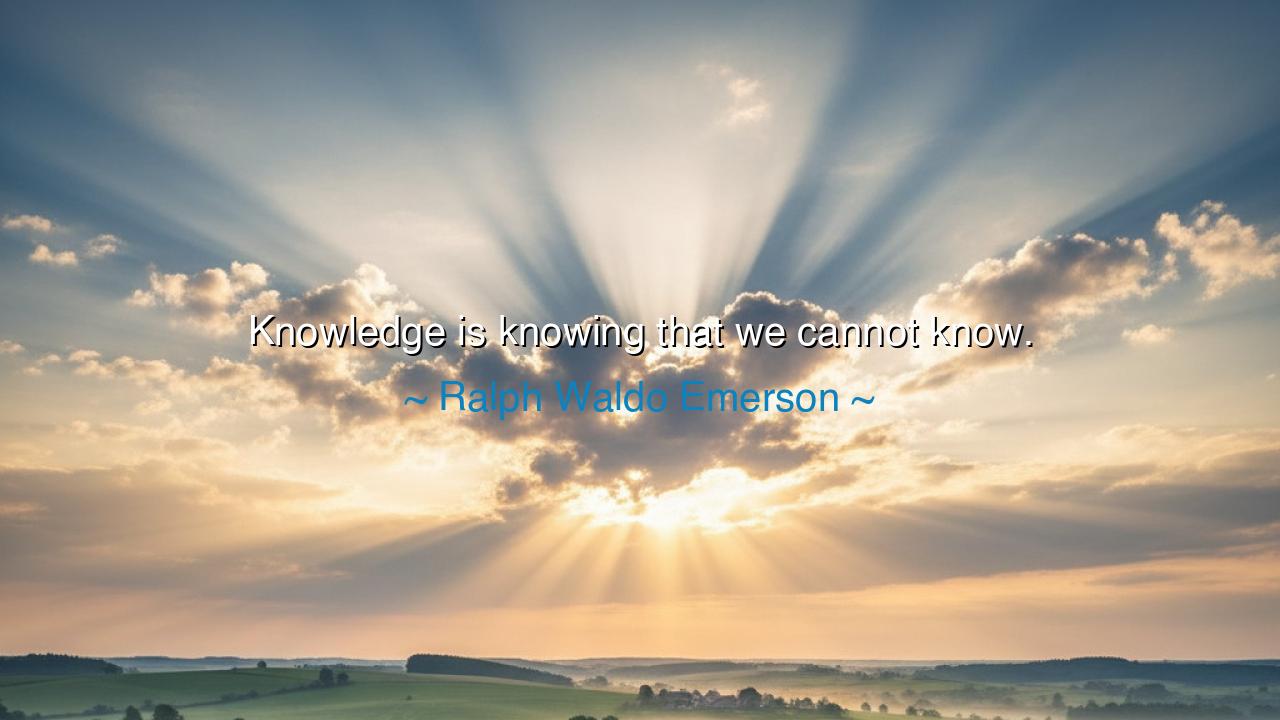
Knowledge is knowing that we cannot know.






Hear the words of Ralph Waldo Emerson, the sage of Concord, who declared: “Knowledge is knowing that we cannot know.” This phrase is not despair but wisdom, not defeat but liberation. For Emerson speaks the eternal truth—that the universe is infinite, the human mind is finite, and the wisest among us are those who bow before this mystery. To know that we cannot know is to embrace humility, to recognize that our grasp is small compared to the vastness of truth.
The ancients too echoed this thought. The oracle at Delphi declared Socrates the wisest man in Greece, and when asked why, Socrates replied that it was because he alone knew that he knew nothing. This confession was not emptiness—it was the highest form of knowledge, for it opened the soul to endless learning. The fool believes he has mastered all things; the wise recognize the horizon ever receding, and so they continue the sacred journey of discovery. Emerson’s words are thus kin to the wisdom of ages: the true scholar is not one who holds all answers, but one who walks humbly before the great unknown.
Consider the scientists who unraveled the secrets of the atom. Each revelation brought power, yet each discovery opened deeper mysteries: What lies within the proton? What fabric weaves the universe together? With every step, their knowledge multiplied, and with it, their awareness of how little they truly knew. This is the paradox Emerson illuminates: the greater the light of learning, the larger the shadow of mystery it casts.
Yet let us not mistake this for hopelessness. To know that we cannot know is not to abandon inquiry, but to sanctify it. It means to pursue truth without arrogance, to question without presuming mastery, to search not for the pride of certainty but for the joy of wonder. It means to walk as pilgrims in a sacred land, where every answer is but a doorway to greater questions, and every discovery a reminder of how infinite the universe remains.
History offers us examples of both paths: those who clung to the illusion of total certainty, and those who embraced the humility of mystery. The medieval rulers who silenced new ideas thought they possessed all knowledge, and thus they condemned their societies to stagnation. But the explorers who dared to say, “We do not yet know what lies beyond the sea,” opened the world to discovery. The difference was not in facts possessed, but in spirit: one was closed, the other open.
The lesson, then, is clear: true knowledge begins with humility. Admit what you do not know, and your mind will remain open to growth. Beware the arrogance of thinking you have arrived at the final truth, for that arrogance is the death of learning. Instead, let your heart remain restless, your spirit curious, your eyes ever open to the wonder of creation.
Therefore, let this be your practice: in every conversation, be ready to listen more than you speak. In every study, be eager to learn rather than to prove. In every mystery, rejoice not in frustration but in wonder. When you find yourself declaring certainty, pause and ask, “Is there more I cannot yet see?” In this way, you will live as Emerson taught—not as one who claims mastery over truth, but as one who honors truth by seeking it endlessly. For truly, knowledge is knowing that we cannot know, and in that knowing lies the freedom to never cease growing.






AAdministratorAdministrator
Welcome, honored guests. Please leave a comment, we will respond soon